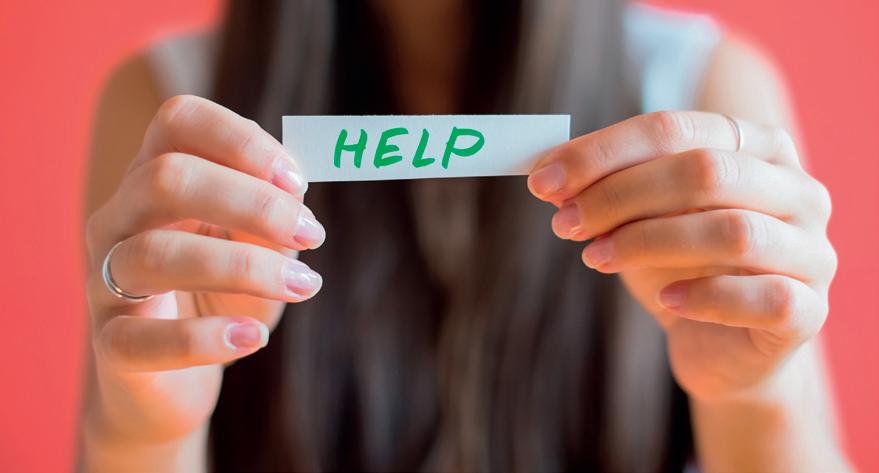
26 minute read
MIND
INTRODUCTION TO YOUR MIND
You may not feel it now but being a teenager today can be really tough. Students have never faced pressure quite as much as they do now. Concerns about workload, money, home-life, relationships, social media and uncertainty about the future can cause a detrimental effect on the mental health of students. Just remember that it’s perfectly fine to say, “I am not OK.”
Mental health is just as important as our physical health. Thankfully, society is becoming more accepting of people who are honest about their mental health, and the more people who speak up, the more accepted it will become to seek help. Mental health is critical to our wellbeing, but there are times in life when we all struggle. The key to mental resilience is learning when and how to ask for help…
STRESS & YOUR BRAIN External pressures – such as falling behind with school work, a toxic friendship or being bullied – can have a huge impact on your brain. When stressed like this, the brain releases excess cortisol (a stress hormone), which has been linked to memory loss and premature brain ageing. Stress can manifest itself in many different ways – you might feel a sense of panic (think: jittery limbs, sweating, shortness of breath, a faster heart rate, etc) and you might even get a headache. While it’s impossible to eliminate all stress in your life, there are ways to reduce it.
If you’re suffering from mental ill health such as depression, anxiety or any other unusual thoughts, tell a trusted friend or parent, your GP or your tutor as soon as you can. GETTING HELP MANAGING STRESS Stress often comes and goes, usually when you’re pushed out of your comfort zone – like when facing a tough exam or going for an interview. If you’re feeling tense and anxious, try these techniques to calm your nerves:
■ It’s common to be nervous of the unknown, so think through some of the common eventualities and plan out what you’ll do – that way you’ll feel prepared and calmer about the outcome.
■ Make time to relax and meditate. Sit in a quiet area, close your eyes and take five deep breaths, in and out.
■ Get a decent night’s sleep, so that you feel rested and ready for the new day.
■ Go for a walk to get some fresh air and clear your head.
■ Thinking positively about the things you can control is more likely to help you overcome the hurdle you’re facing. If you don’t get the grades you want, there will be an option to re-take.
THE BEST MIND APPS
All of these are available for free and are suitable for both Apple and Android phones:
Headspace: This app makes meditation simple. Through the guided sessions, learn meditation and mindfulness in just 10 minutes a day.
Peak Brain Training: Challenge your cognitive skills with over 30 fun games. View your Stats to track your progress over time.
SAM: Developed by a team of psychologists, this app offers a range of selfhelp methods for people who are serious about managing their stress and anxiety levels.
MAYBE THERE’S AN APP FOR THAT
MANAGING STRESS & ANXIETY
Your teenage years are full of new experiences, new friends and new surroundings. This should be a really exciting time, but feeling stressed and anxious is completely normal for lots of teens. Here’s what you need to know - and how to cope…
It’s highly likely that you have suffered some sort of stress or anxiety already in your life. Whether it was because of your school work, family life or a relationship, we all feel this way from time to time regardless of age, gender or perceived success.
Being a teenager today can be really tough. You may find that you are taking on too much, finding it hard to make friends or you worry for the future - this is all natural. But for some teens, these years can be exceptionally challenging - especially if you don’t have support from your family

or friends. Whatever your circumstances, it is important to regularly check in on yourself and consider how you are coping. This will probably change from time to time. The most important thing you can do is to get help whenever you need it. It’s alarming that lots of people experiencing stress and depression don’t seek help. Some are too embarrassed, worried they are bothering people or are simply unaware that help is available to them.
One of the biggest challenges for teens is that everyone around them appears to be coping well and taking everything in their stride. They seem to have lots of friends, post amazing photos on Instagram, and hand in all of their assignments on time. But behind the scenes, the reality is often completely different. There are very few people who don’t suffer from stress or anxiety at some point, so it’s importnant to realise that you’re not alone or different.
GETTING HELP
Whilst mental health is now talked about more, lot’s of people still struggle to come forward and seek help. Often, they feel embarrassed or weak, especially when they believe they should be fine or happy. The good news is that there are various places to go for help. Speaking to a trusted parent, teacher or friend could be a good place to start. Going to see someone in your school’s wellbeing or pastoral team, or your GP, is another good option. They will understand the pressures on students and can often offer HELP bespoke support. If you prefer to speak to someone confidentially, you can call Childline for free on 0800 1111.
Regardless of the route you choose, remember that it takes strength and courage to say you need support, and no one will ever judge you for seeking it.
SOCIAL MEDIA AND PERFECTIONISM
It’s not easy scrolling through your social media feeds and seeing beautiful people travelling to incredible places and experiencing amazing things. Sometimes we wonder why our photos don’t match up – even after we’ve posed 20 times, cropped out our mates with their eyes closed and applied a Lark filter, they still don’t seem to compare. The truth is that the photos you’re looking at are usually heavily edited and often give a distorted view of reality. For example,


some celebs have been caught Photoshopping their pics, and pretty much everyone posts only the best bits of their life. (When did you last post a photo of yourself doing the laundry?) Others have been known to hire sports cars and swanky Airbnbs to give the illusion of a millionaire’s lifestyle. The reality? All smoke and mirrors. So, the next time you feel envious of someone else’s life, body, car or house – or strive to be as ‘perfect’ as them – remember what you’re aiming for probably doesn’t even exist.

LOOKING AT DEPRESSION The pressures facing teens can be immense, making depression a fact of life for many young people. Just remember that you’re not alone.
There will be moments when life won’t all go to plan. With exam stress, pressure to achieve and trying to juggle friendships, family-life and coursework, it’s no wonder that young people can be susceptible to stress, anxiety and low moods. But when does ‘feeling down’ turn into depression?
What is depression? How many times have you heard people say they’re depressed, when they’re really not? The English language doesn’t always have the right words to convey how we feel and not everyone’s understanding is the same. Being ‘a bit down’ or ‘fed up’ is very different from depression. If you’re feeling a bit low, you can usually make yourself feel better by sleeping it off or resolving the underlying issues, so the feeling goes away. But when you’re suffering from depression, it’s something that lasts for weeks or even months. It’s a state of mind that’s hard to escape from, no matter what you try. Sufferers sometimes feel that they’re not equipped with the skills to solve their problems and that there’s little point in trying. There’s also a misconception
When you’re feeling low, it’s easy to turn to drink or drugs, but that’s one of the worst things you can do. Both will ultimately make you feel even worse, even if they offer a brief reprieve. Instead, seek help. IT’S A FACT that the sufferer’s life must be a mess. But that’s the crux of depression: it doesn’t discriminate and can affect anyone regardless of perceived success, wealth or appearance.
You’re not alone The pressures facing young people have led to a huge increase in depression so while you may think that nobody else feels your pain, you’re actually far from alone. Since the symptoms of depression often come on gradually, sometimes it’s difficult to identify the condition early on, which delays doing something about it. In severe cases of depression, it’s possible to feel so low that you have thoughts of withdrawal, self-harm or suicide. You can also suffer from
SIGNS TO LOOK OUT FOR
The symptoms of depression vary from one person to another, but anybody suffering from it will be battling with at least some of these: ■ Feeling sad or hopeless ■ Losing interest in things they’ve previously enjoyed ■ Anxiety ■ Tearfulness ■ Poor sleep and tiredness ■ Unexplained aches and pains ■ Self-harming ■ Low self-esteem ■ Feeling intolerant or irritable ■ Finding decision making to be difficult ■ Paranoid thinking ■ Suicidal thoughts ■ Feeling that there’s no point in living
psychotic episodes, which is where you start to see, hear or believe things that aren’t real.
Even if you’re feeling fine, one of your friends may not be, so look out for anyone struggling academically, taking part in fewer social activities or avoiding social contact altogether. They could also be neglecting their interests or be having problems at home or in a relationship. Stay vigilant – you could be the person who breaks the cycle. Feel better, faster You can ease the effects of depression and keep your mind healthy by using these three techniques, courtesy of mental health charity Mind (mind.org.uk).

■ Break the cycle of negativity. Dark thoughts often breed more dark thoughts, so think of positive things you’ve achieved and things you’re grateful for. ■ Do something active to keep your mind on something else. It needn’t be strenuous.
■ Connect with others as often as possible, even if it’s just a quick phone call.
If you think you might be depressed, or are struggling with your mental health, seek advice from your school, a parent or your GP as soon as possible. GET HELP


If someone tells you they feel suicidal, urge them to get help and follow up with them. Show that you are there for them - they will need a friend.
SUICIDE

If you are experiencing suicidal thoughts, or you know someone who is, read this now
It’s not uncommon that they don’t wish to live any to feel so low that more. Suicidal thoughts can you can’t see a way make sufferers feel confused, out. Suicidal thoughts often lonely or overwhelmed. occur when the sufferer feels People with suicidal sadness or pain, and doesn’t thoughts may cut or burn their feel they’re equipped with the bodies, take extreme risks with tools to cope. It can feel like drugs or alcohol, show signs life is pointless and the sufferer of eating disorders, or act out has no purpose – that the only in an aggressive way. If this solution is to end their life. sounds like you, remember Some people have abstract that however desperate or thoughts about ending their isolated you may be feeling, life, and for others, it’s a clear anything can be resolved. If plan on how to achieve this. you’re suffering, always seek
Sometimes, sufferers don’t help as soon as possible - know why they feel suicidal, there is no problem that can’t and other times there can be be fixed. an obvious trigger event, such as a bereavement, a perceived failure in life, or some other “NO MATTER HOW devastating news. Feeling SAD, MAD, STRESSED, suicidal often leads to feelings of shame or embarrassment, which can compound the issue. Often, people feel unsure whether they want to FRUSTRATED OR LONELY YOU FEEL, SUICIDE IS NEVER THE ANSWER” end their lives; they just know
WHAT TO DO
If you feel suicidal, or someone tells you that they feel suicidal, do one (or a combination) of these:
■ Make contact with your tutor or a GP as soon as possible (even if the sufferer tells you not to)
■ Contact Childline on 0800 1111 if you want to speak to someone confidentially
■ Go, or take the sufferer, to your nearest A&E and speak to the medical staff
■ Contact NHS on 111
■ If you feel like something drastic is about to happen, call 999 straight away.
FEELING LONELY Sometimes you can be surrounded by people, but still feel lonely. Here’s some practical advice...

Feeling isolated or lonely as a teen can be a particularly difficult experience, especially when you don’t have any friends to talk to. Even if you are at school all day and live in a house with all of your family, you can still feel alone. Maybe you feel that people don’t understand you, or maybe you find it hard to make close friends. Firstly, lots of people feel like this at some point, whether they admit it or not. It might not look like others are struggling, but some probably are. So don’t believe you’re a failure for feeling this way and neither should you feel guilty. Here’s how to cope with isolation …
Get plenty of exercise and eat well. If you’re feeling down, taking care of your body will help you feel better quicker. Get outside. You may not fancy it but head outside to visit friends or just go for a walk. Being out in the fresh air really will help you feel better.
Keep in touch. Call, Skype or even snail mail with your friends and family and be honest about how you’re feeling. You may find that some of your friends feel exactly the same way.
Keep a journal. Some people find writing their thoughts down really therapeutic. Write whatever you want – no one will ever see it but you.
IT MIGHT NOT LOOK LIKE OTHERS ARE STRUGGLING, BUT SOME PROBABLY ARE THG’S GUIDE TO MAKING FRIENDS
■ Get involved in clubs or hobbies that interest you. By being there, you’ll have one thing in common with everyone!
■ If you struggle meeting new people face to face, use school Facebook pages or Twitter feeds to meet new people but be careful with who you speak to online.
■ Keep your door to your bedroom open to show your siblings and parents you’re up for a chat.
■ Don’t be afraid to smile and say “Hi”. What’s the worst that can happen?
BULLYING
You might think that peer pressure and bullying are generally confined to the playground. Sadly, you’d be wrong…
Bullying takes many forms – including name-calling, physical assault, spreading rumours, stealing, excluding people and turning someone’s friends or colleagues against them. Happy, secure people don’t bully others; it’s the bullies who have the problem, not those they target. Bullying is experienced by many people at some point, and sadly it doesn’t end at school – in the UK, nearly a third of people say they’ve been bullied at work. If you’re a target, you need to put an end to it. Here’s how:
■ Keep a diary: dates, times, places, who was there and what happened.
■ If you’re being cyber-bullied, save messages, screen grabs and call records – but don’t respond to the bully.
■ Tell someone right away. If it’s at school, get in touch with your tutor. If it’s at work, tell your boss. If you’re being harassed outside of a formal setting, call the police on 101 (or 999 if it’s an emergency).
Driven to the brink If you bully someone, you could be responsible for pushing them to the brink. It’s easy to see picking on someone as harmless teasing, but nearly half of suicides of young people are because of bullying. Many other victims of bullying have to skip class or work because they can’t concentrate, and the effects on their self-esteem and confidence can last for years.

Whistle-blowing A ‘whistle-blower’ is someone who exposes information or activity that’s illegal, unethical or incorrect. Whilst this might refer to activities within an organisation, it can also refer to behaviour of individuals or school culture. If you witness bullying where you at your school, it’s important to speak up, as the person being bullied
ONLINE BULLYING With the rise of the internet has come the rise of the trolls. Online (cyber) bullying can be just as hurtful as face-to-face bullying. Because we lead such connected lives, it can happen anywhere at any time. To deal with it:
■ Block abusers on social media or your phone.
■ Keep your personal details from those you don’t trust. may not have the courage to do so. You should tell someone at school confidentially about what you have seen - maybe a tutor or member of the pastoral team - and make it clear if you wish to remain anonymous.
■ Adjust your privacy settings on social media to control who sees what.
If someone posts something online that you disagree with, just ignore it. Posting nasty stuff in the comments section is unnecessary. Think: “Would I actually say this to someone’s face?” While there isn’t a specific online bullying law in the UK, some actions can be criminal offences.
PEER PRESSURE

■ ditchthelabel.org ■ ■ bullying.co.uk GET HELP

No one wants to be the victim of peer pressure, but it can easily happen. Sometimes, it’s pretty harmless: say, you’re trying to eat clean in the week and all your mates pressure you into ditching the diet in favour of a Pizza Express. Naughty but harmless! However, you might come across situations that are a little different, particularly if they’re unfamiliar.
It’s important to know the difference between harmless teasing from your mates, to participating in things that you genuinely don’t want to do, for fear of what people may say or how they may
STUDENTS ARE A DIVERSE BUNCH OF PEOPLE. IF YOUR NEW MATES DON’T QUITE ‘GET’ YOU, FIND SOME THAT DO
react. This is completely different for everyone – the experiences someone wants to participate in, and those they wish to decline, are personal to them. Even if their behaviour seems odd or unusual to you, it’s completely their choice and they should be allowed to do what they want without judgement or bullying.
So, why do people succumb to peer pressure, either knowingly or otherwise? Usually, it’s to fit in. If your mates are experimenting by using drugs, drinking alcohol and or being sexually promiscuous, it doesn’t mean you have to do this as well. Now is a great time to figure out who you are and the type of person you want to be. Students are a diverse bunch of people. If your new mates don’t quite ‘get’ you, that’s fine. Find a club or group of friends who do, and who accept you for who you are.

PERSONAL RELATIONSHIPS There are lots of benefits to having great relationships, but what should you do when they veer off track? T here are many types of relationship, but broadly speaking in healthy relationships. But when someone stops listening to you, or the dynamic in they usually fall into one the relationship starts to of four categories: family, sour and make you think friendship, romantic or “ugh”, it’s time to take swift professional. What’s normal action. If the relationship in one type of relationship may makes you unhappy, seem weird in another. In any consider cutting relationship, think carefully it off. And, if the about what you want out of it, relationship becomes what the other person wants abusive, tell someone out of it, and whether you’re you trust. If it’s anything comfortable. sexually abusive or
Consciously developing and illegal, speak to the working on relationships is a police on 101, or great way to keep them healthy 999 if it is an and strong. However, it’s also emergency. important to understand that you’re only one part of a relationship. People change, and so do circumstances. These are often beyond your control, so you shouldn’t blame yourself if a relationship gets tough or crumbles. Even though you might not be able to help the other person see things differently or make them change, you can control how you interpret what’s going on and how you behave. In other words, stay focussed on the things that you can change and don’t waste time and worry and about the things that you can’t.
Good communication and managing other people’s expectations are important
4SIGNS YOU NEED TO MOVE ON
Bad relationships can be the source of stress and anxiety. Here’s what to watch out for: ■ You no longer enjoy someone’s company. ■ You feel like they’re taking advantage of you. ■ You don’t trust them and/ or they don’t trust you. ■ They ask you to do things you don’t want to do.

Don’t let someone change who you are to be who they need. That’s just a recipe for disaster… TOP TIP DEALING WITH A BREAK-UP We know it hurts now, but it will get better, honest! Here’s how to keep moving forward:
Do stop all contact. Don’t look on their Facebook, Twitter, Snapchat or Insta profiles for a while.
Do call your mates. No one knows how to cheer you up like they do. Be positive. Regardless of what went down, you do have worth and you will get over this.
Don’t let your health slip.
Make sure you eat, drink loads of water and get lots of rest. It will get you back on your feet much quicker.
Don’t ignore your studies.
Your degree will last a lifetime but mourning for your ex won’t. Try not to fall behind, as you’ll regret it later on down the line when you have a lot of catching up to do.

Don’t suffer in silence.
Even if you hadn’t been together that long, it’s OK to be really affected by a break-up – you’re allowed to be sad and upset. If you think that it’s affecting your mental health, seek help from your school. You might feel silly saying that a break-up has made you feel this way, but it’s a perfectly normal reaction.
SLEEP
We all know sleep is crucial to our wellbeing, but loads of us still don’t get enough of it. Here’s how to achieve the magic number of good-quality kip...
Very few people are regular sleepers, in that they go to sleep and get up at exactly the same time each day. We all lead busy lives and, unfortunately, the one thing we tend not to prioritise is sleep. Sleep is incredibly important for energy, mood and general wellbeing. As we sleep, our bodies have the opportunity to unwind and repair, allowing us to wake up, feel rested Go to bed at the same time (as often as possible) and wake up (always) at the same time every day – no pressing the snooze button! and face another day. It’s likely that after a good night’s sleep you’ll feel alert, be able to make quick decisions, focus better and be more creative. On the other hand, not getting enough zzz’s can cause longterm health issues and affect the way you think, react, work and interact with others.
Everyone functions slightly differently, but research suggests that around eight to nine hours per night is the magic number for most

Minimise noise and light, and keep the temperature a little low (15-19 degrees is ideal) people. If you think that’s too much sleep for you, just remember that there’s a big difference between what you need and what you can get by on. If you feel tired in class or at any point during the day, you need more quality sleep.
Distractions from social media, gaming, outside noise or ticking clocks can leave you bleary-eyed each morning, so check out these tips on how to log more hours in quality slumber:
Exercise regularly and avoid caffeine from the afternoon onwards
Use relaxation or meditation techniques before going to bed
Avoid digital devices at least one hour before you turn in Use the ‘do not disturb’ function on your phone to limit late-night texts
MINDFULNESS
Many people are now seeking stuck in a pattern of negative to regain control of their minds thinking, consciously practising through practising meditation mindfulness can help break the and mindfulness – but what cycle. Believe it or not, your exactly does that mean? breathing is central to the here
Mindfulness is about focusing and now, and it’s also central on your breathing, being aware to the concept of mindfulness. of what’s happening in the By focusing intensely on that moment, accepting whatever important bodily function, you’re experiencing and letting you can quickly tune in to your it go. The best part? You can natural rhythm and start to be mindful anytime, anywhere, feel calmer and happier. Whilst no matter what you’re doing. meditation won’t work for or It sounds simple, but it’s suit everyone, it is a not always easy to do, great thing to try at especially when you’re stressed. If you start to experience a stressful situation or get “Believe it or not, your breathing is central to the concept of mindfulness” home to see if this something that can help you relax and unwind when you need it most. HOW TO MEDITATE
1Find a seated position that’s comfortable but not too comfortable. This could be in a chair or on the floor. Rest your hands on your knees. You want to be relaxed enough to concentrate and be still for five minutes, but not so loose that you fall asleep.
2Keep a tall spine. Inhale, roll your shoulders up to your ears. Exhale, roll them back and down. Every time you feel yourself hunching forward or slumping, reset your spinal position with this inhale/exhale rolling shoulder technique. If you maintain a good posture, you’re less likely to get tired and fidgety.
3Gently close your eyes, and breathe slowly and deeply – breathing through your nose makes it easier to find a smooth, even pace. Focus on the area between your nostrils and your upper lip. Observe the air entering and exiting your body as it passes over this spot.
DIGITAL OVERLOAD Studies are finding that technology can have a profound effect on our mental and physical health. How can we protect ourselves?
Using smartphones, tablets and computers has become a way of life – we use them all day, every day. You’ve likely outsourced your memory and processes to Google; check the news online; and manage your money by app. This may increase your efficiency, but it can be bad news for your mind. Here are just some of the ways technology can mess with your head – but don’t worry, each problem also comes with a simple solution…
EFFECT OF TOO MUCH TECH
FOMO (‘fear of missing out’).
You stay in but seeing your mates at a party on social media can make you regret your choice.
A poor night’s sleep. Glowing tablet or mobile screens can trick your body into thinking it’s daytime, so our internal body clock gets confused and you can’t sleep. SOLUTION
The hardest thing to do in this situation is to put the phone down. If you’ve managed that, go for a walk instead of scouring social media.

Take regular breaks from devices throughout the day and avoid all screens for at least an hour before bed to allow your mind to unwind, so you can sleep soundly.
You remember less. Why bother to learn the capital of Kenya when you can ask Siri? Do something offline, like going to the cinema with your mates. Keep your phone switched off and allow yourself some downtime.
Shorter attention spans. You’re used to short snippets of information read at speed, so textbooks and assigned reading can be painful.
Skewed relationships. Social media gives an edited portrayal of friends’ lives, which can alter your perceptions. Give the screen a break and opt to read books offline where possible. It will give your eyes and mind a break, and will increase your focus when you get back to the screen later.
Try to meet new people in real life to develop offline friendships and get the full picture of someone’s life outside of social media.
The illusion of perfect people. Instagram is full of perfect people with jet-set lives. You end up chasing ‘likes’. Often, it’s simply an illusion – lots of the images you see will be edited. Instead of wasting hours online, spend time developing yourself offline.

HAPPINESS HACKS Need a pick-me-up? Here’s some quick fixes to make yourself happier…
EXERCISE MORE It has been scientifically proven that moderate exercise can have a positive impact on mood, stress, self-esteem and anxiety. Even just a walk every day can help. Check out page 46 for further information. GET YOUR ZZZ More sleep has been proven to boost emotion, making participants more positive in their outlook. Lack of sleep, by contrast, has been linked with mental health conditions such as anxiety and depression. LIMIT SOCIAL MEDIA… We all know that social media can be bad for our mental health. Moderation is key. If you think you are logging on too much, or its distracting you from your uni work, delete the apps and take a break for a day or two. …BUT INCREASE SOCIAL TIME Not all ‘social’ is created equal. Taking time out to call friends and family is a great way to stay connected (particularly if you are missing home) and give yourself a bit of down-time. Visiting them regularly too. DO THE THINGS YOU LOVE Regardless of what anyone thinks about your hobbies and interests, always do the things you love. Whether it’s sport, special interest groups or your favourite TV programme, make time for the things that make you smile.


